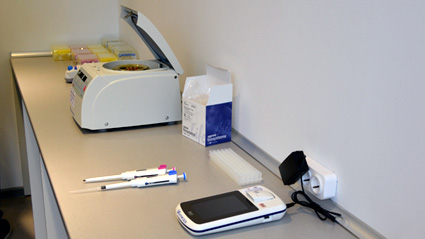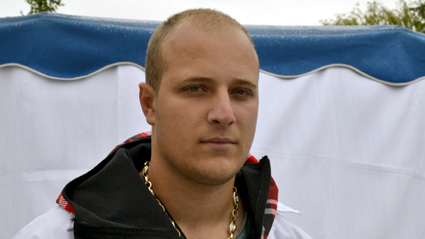Minister of Agriculture and Food Desislava Taneva and Director of the Swiss Federal Office for Agriculture (FOAG) Bernard Lehmann unveiled at a solemn ceremony the National DNA Analysis Genetic Lab. The funding for the lab equipment has been provided by the Bulgarian-Swiss Cooperation Programme under the Let’s Link Nature’s Protection with the Sustainable Development of Rural Areas Project. The lab can be found with the Executive Agency for Selection and Reproduction of Livestock Breeding in Sofia. It will help for the distinction of certain types of animals’ breeds via modern technologies. More from Minister Taneva:
 “This will also assist us in the creation of breeding programmes via the different associations for the raising of a certain breed, following the latest programmes. The animals selected will be highly productive according to the breed’s type and purpose – whether it is used for meat, milk etc. Bulgaria has extreme biodiversity in this aspect – many local, old, typically Bulgarian breeds, all kinds of animals, mostly sheep. We have selected 21 Bulgarian breeds so far. This set of tools, unveiled today at the National DNA Analysis Genetic Lab will give us a chance to find out the genes of each animal, raised in Bulgaria. This scientific method is the latest used by all developed countries in regard with livestock breeding. The lab is worth some EUR 250,000, no VAT included and is a part of the For the Balkan and the People project. The lab will allow us to have the best genetic control of animals, making sure they are precisely the ones we want.”
“This will also assist us in the creation of breeding programmes via the different associations for the raising of a certain breed, following the latest programmes. The animals selected will be highly productive according to the breed’s type and purpose – whether it is used for meat, milk etc. Bulgaria has extreme biodiversity in this aspect – many local, old, typically Bulgarian breeds, all kinds of animals, mostly sheep. We have selected 21 Bulgarian breeds so far. This set of tools, unveiled today at the National DNA Analysis Genetic Lab will give us a chance to find out the genes of each animal, raised in Bulgaria. This scientific method is the latest used by all developed countries in regard with livestock breeding. The lab is worth some EUR 250,000, no VAT included and is a part of the For the Balkan and the People project. The lab will allow us to have the best genetic control of animals, making sure they are precisely the ones we want.”
 Farmer Yane Kulov attended the unveiling of the new lab, offering part of his production. The man raises rare animal breeds: Karakachan Sheep, the Bulgarian Murra buffalo etc. He produces yoghurt, sheep and buffalo cheese. Here is what Yane says:
Farmer Yane Kulov attended the unveiling of the new lab, offering part of his production. The man raises rare animal breeds: Karakachan Sheep, the Bulgarian Murra buffalo etc. He produces yoghurt, sheep and buffalo cheese. Here is what Yane says:
“The lab is useful for all livestock breeders in Bulgaria. We can control the quality of the animals and the breed’s purity – whether it is real or not. Sometimes the papers say that everything is real and in fact the situation turns out to be a bit different…”
English version: Zhivko Stanchev
Photos: Luiza Lazarova"We cannot escape from modern technologies, but we must think about how we can use artificial intelligence to improve the quality of education without losing human contact," said Mimi Nicheva, head of the Bulgarian Sunday School "Sts...
Nearly two centuries ago, in the distant 1838, the Bessarabian Archbishop Dmitry Kishinev and Khotinsky consecrated the magnificent Orthodox church "The Holy Transfiguration of the Lord" , built with voluntary donations and labor by the Bulgarian..
Bringing youthful energy, colour and cheer to the Bulgarian National Radio studio, students from the Bulgarian Sunday School Dr Petar Beron arrived from Larnaca. The group from Cyprus — 16 pupils aged between 14 and 19 — is currently on a week-long..
The so-called Seal of Biliteracy was created in 2011 in the US state of California with the idea that in the conditions of a globalized..
On 27 October, the first meeting of Action CA-24150 “Values in Turbulent Times: Navigating Social Change and Challenges (VISTA)” took place in Brussels...
In the summer of 2014, photographer Philippe Bazin and philosopher Christiane Vollaire traveled around Bulgaria, investigating a series..

+359 2 9336 661
